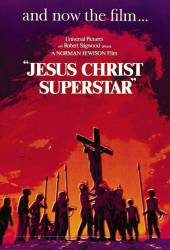Audio problem: During the song "Judas' Death", Caiaphas sings the line "What you have done will be the saving of everyone", but his mouth is saying " the saving of Israel", the song's original lyric. (01:24:00)

Jesus Christ Superstar (1973)
1 audio problem
Directed by: Norman Jewison
Starring: Carl Anderson, Barry Dennen, Ted Neeley, Yvonne Elliman
Audio problem: During the song "Judas' Death", Caiaphas sings the line "What you have done will be the saving of everyone", but his mouth is saying " the saving of Israel", the song's original lyric. (01:24:00)
Jesus: Can you show me now that I will not be killed in vain? Show me just a little of your omnipresent brain! Show me there's a reason for your wanting me to die! You're far too keen on where and how, but not so hot on why.

Trivia: Ted Neely met his wife Leyann on location. She can be seen during the "Simon Zealot" song, the brunette dressed in brown.





Answer: Judas is accusing Jesus of being an worn out public official, someone that perhaps has to be ousted out of office.
ChiChi